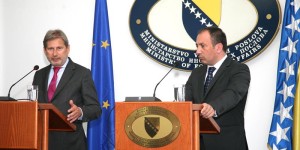by Alisa Dreca
How do you assess recommendations for the reform of the Constitution of the Federation of BiH presented in May this year and is there, according to your opinion, any interest for their implementation?
The EU supports any initiative that will make the BiH administration, including the Federation, function effectively and efficiently. In this regard, there is a need to improve and reform the structures in the Federation in order for them to become more functional.
In August, as you know, the FBiH Government decided to form a high-level working group dealing with constitutional reform in cooperation with some experts. No draft amendments have yet been put into the legislative procedure. We hope this process will move forward.
Several times you have emphasized that the implementation of the decision of the European Court for Human Rights in Strasbourg in the case of ”Sejdić- Finci” is an issue that BiH leaders have to solve. However, if this does not occur in the forthcoming period, are the EU institutions planning to undertake certain restrictions towards BiH?
You can see BiH is already sanctioning itself – the lack of progress means it is falling further behind its neighbours in EU integration.
We encourage all parties in their efforts to find a solution on implementing the ‘Sejdic-Finci’ judgement – that is to say eliminating discrimination from the elections to the BiH Presidency and BiH House of Peoples – particularly as this is the remaining condition for BiH to move forward in the EU integration process. We believe that moving towards the European Union will help create the conditions for more jobs and more investments in BiH.
The Council of the European Union has expressed concerns about the possible implications in view of the 2014 elections and urged BiH, as a matter of urgency, to bring its constitution into compliance with the European Convention on Human Rights.
BiH is expecting publishing of the judgment of the Court in Strasbourg in the case of ”Ilijaz Pilav” which is related to the violation of rights of all constitutive peoples of BiH. If the case becomes rendered in favour of Pilav, how much will it influence the concept of the Dayton model in BiH?
I cannot speculate on judgements which are not announced. Of course, my legal team and I will analyse it as soon as we see it.
How do you see the future of the city of Mostar, considering the fact that this question is one of the issues which BiH politicians have not agreed on?
We believe that all sides in Mostar must engage constructively to find a solution to implementation of the ruling of the Constitutional Court. The citizens of Mostar have the democratic right to elect a new city council and Mayor, but politicians are preventing the holding of elections there. We fully support the conclusions of the Peace Implementation Council that elections should be held in Mostar in 2014 at the latest.
The EU would like to see Mostar, and indeed all BiH, becoming more prosperous and providing a good quality of life, security and efficient services for its citizens. We believe that if all levels of government in BiH including Mostar adopt EU standards and acquis, this will provide a solid framework for economic development, investment and the rule of law.
The economic development of Mostar and its citizens’ well-being are seriously affected by politicans’ continuing failure to find compromise on an elections model for Mostar. We would like to see the Mostar Statute amended in a way to ensure the city is united has a fair and effective administration that works in the interests of all of Mostar’s citizens, and provides the kind of public services that citizens deserve.
The fact is that EU Delegation to BiH is one of the biggest institutions interested in helping BiH in the process of Euro-Atlantic integrations. How much is that helping or not helping BiH politicians to take responsibility for the BiH future in their own hands?
The EU is here to support BiH in its efforts towards eventual EU membership. Ultimately the responsibility lies with the BiH political leaders and institutions and we cannot substitute for them. The resources we have committed in BiH are, we believe, proportionate to the task at hand.
We have seen a high level of rhetoric about EU integration – but little action and few results delivered. This is very disappointing and means that Bosnia and Herzegovina has fallen further behind in the region.
We know the people of this country want an EU future. The EU is ready to do our part. We now need to see all authorities, all leaders and all institutions find consensus, find agreements and make progress. In short, it’s time for results – it’s time for those in authority to step up and take responsibility.
Are there any EU mechanisms which are enabling the monitoring over funds approved for realization of projects in BiH?
Yes, EU keeps a close eye on the use of EU funding and project progress. The EU Delegation to Bosnia and Herzegovina is responsible for procuring and contracting projects financed from EU Instrument of Pre-Accession Assistance (IPA). Once the projects are ongoing we monitor the implementation and progress of the projects jointly with our BiH counterparts. For example we have the IPA Monitoring Committee that meets regularly. IPA Monitoring Committee is a joint meeting between European Union and Bosnia and Herzegovina that gives the BiH institutions the possibility to exercise ownership of the assistance and to demonstrate the achievements made or problems encountered. The purpose of the meeting is that the assistance under IPA is better targeted and focused on results in order to help Bosnia and Herzegovina on the European Integration path.
In addition projects have their individual Steering Committee meetings, which are attended by all project parties and that discuss the progress of the particular project. In addition to audit, the European Commission engages regularly also outside assessors to scrutinise the implementation of EU-funded projects.
Recently EU resources for BiH agricultural sector, sector for rural development and the tourism sector have been suspended. Is there any way to mobilize them again and is there risk that other sectors will face the suspension of IPA resources?
The European Commission had to cancel the two agriculture projects previously suspended, totalling 5 million Euro, due to the failure of the authorities in BiH to agree on the domestic structures to deliver EU agriculture and rural development assistance funds (IPARD).
The lack of an agreement on the implementation of these two agricultural projects does not only mean a loss of more than 5 million Euro of the two cancelled projects but will also prevent the timely set-up of structures to channel significant future EU funds to BiH rural areas. That money has been lost and there is no way to mobilise it again.
The cancellation of these projects also underlines the urgency to set up a functional coordination mechanism to ensure that the country and its population are able to receive EU pre-accession funds in the future.
When it comes to the five other suspended projects, with a total value of 9 million euro, those suspensions have been lifted. So, the two projects supporting SMEs and tourism (4.5 million EUR) which were suspended in July, the two planned projects to foster social inclusion (3 million EUR) and one on-going project strengthening the National Planning Process in BiH (1.5 million EUR) are under way again.
With regard to IPA 2013, the amount of EUR 41.9 million for Bosnia and Herzegovina is EUR 45 million less than initially envisaged. The reduced amount of funds is a result of an assessment formulated in the European Commission 2013 Progress Report that it is increasingly “difficult to justify providing pre-accession funds to a country whose political representatives are not willing to reach the consensus necessary to move forward on the pre-accession path. Without this consensus, there is a strong risk that pre-accession assistance will not produce the expected results.”
Do you believe that BiH could function as a unique economic space and which are crucial steps which should be made in the forthcoming period in order to achieve this?
The economy of Bosnia and Herzegovina faces some serious challenges, not only in terms of economic performance but much more for the lack of commitment to reform and structural adjustment.
BiH is still some way away from being a single economic space. Among other things: there are different requirements for registering and operating firms in the two entities and the Brcko District; important commercial legislation is applied differently in different parts of the country; firms are required to register twice in order to operate in the entire country and so on.
In addition, recent initiatives seem to be going in the wrong direction, for example a recent decision of the FBiH government saying that goods can be sold in the FBiH territory only if examined by FBiH customs inspectors. This is surprising, since Bosnia and Herzegovina is one single customs territory.
The EU does not support decisions or actions that have the effect of protectionism – this is counter to the spirit of the Interim Agreement of the EU and BiH on trade and trade related matters. The same would be the case if similar measures were to be introduced by the RS.
One of the main achievements of the European Union, and one of its continuing principles, is the creation of a single economic space at the beginning of the 1990s. Every country that aspires to be a member of the EU needs its legal, institutional and policy frameworks to reflect this important economic reality, and as much as possible to start to get in line with the functioning of the single market.
According to your opinion, what should be done in order to make BiH competitive, economically stabile and an investor-attractive country?
The 2013 Progress Report indicates that in order to move forward, Bosnia and Herzegovina needs to address a number of issues. Actually, seven issues are mentioned:
– Bosnia and Herzegovina`s authorities needs to be supportive towards private sector business environment, most notably by improving contract enforcement procedures and by establishing a single, a single economic space;
– Also, a comprehensive reform of the labour market is needed to provide both flexibility for the employers as well for the employees and to give to employees minimum level of security
– Bosnia and Herzegovina for third point needs to liberalize network industries, most notably in the areas of energy, telecommunication, transport and water supply;
– Fourth, it needs to address the issue of State Aid, which still remains high, with the state continuing to influence the economy throughout the numerous state-owned monopolies.
– BiH must reduce the large public sector, which currently spends money inefficiently and interferes with the economy by crowding out resources from the private sector;
– The country needs to reinvigorate the privatization agenda, which has the potential to reduce waste, bring in much needed income for governments, more importantly, it will result in both lower prices for consumers and new opportunities for investors;
– And finally, Bosnia and Herzegovina must make a dedicated effort towards tackling corruption at all levels of public administration. And these are the points that were mentioned in this year`s report.
As you can see, there is ‘nothing new under the sun’. Various organisations and institutions, business communities and economists have repeatedly stated what BiH should do to help its economy and ultimately provide better life for its citizens. I would like to see your authorities acting upon these recommendations. For a start, they could implement seven recommendations from this year’s Progress Report.



